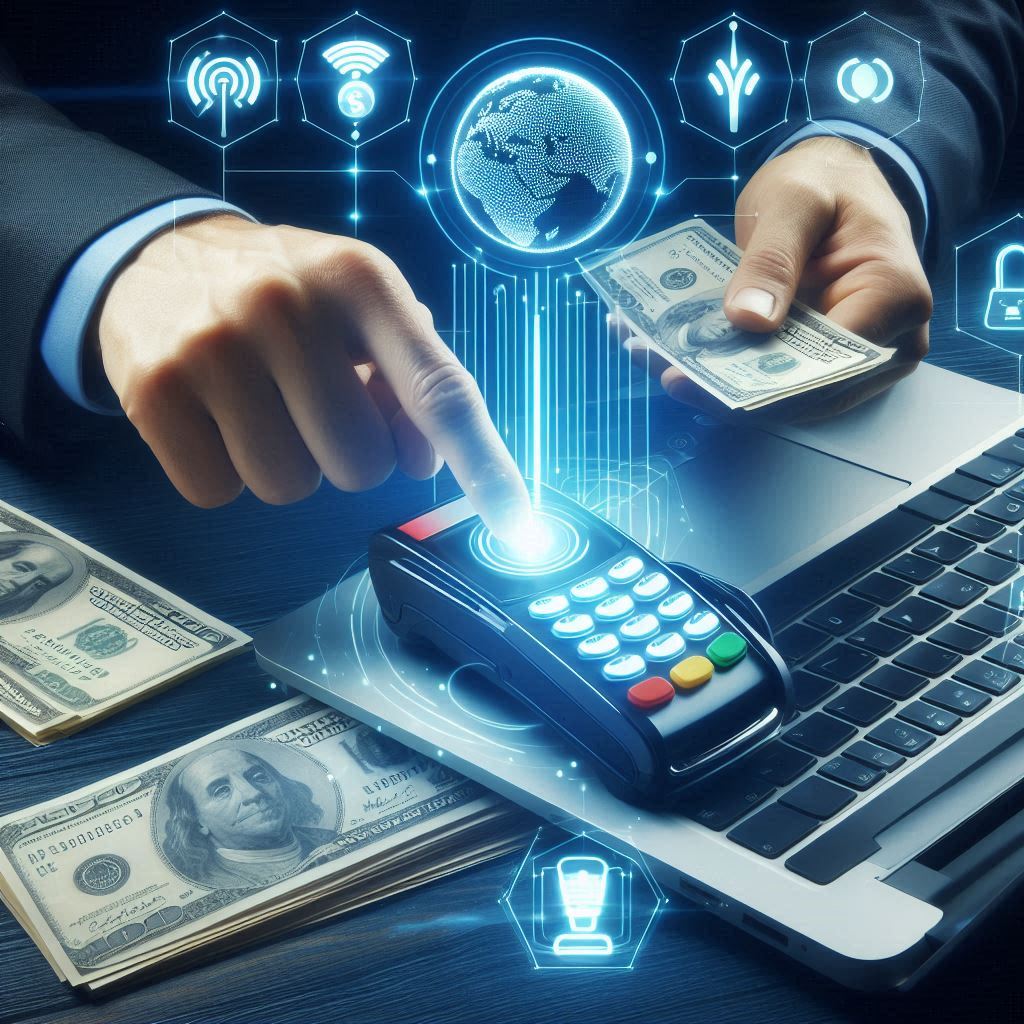Introduction
In today’s fast-paced world, digital wallets and mobile payments are revolutionizing how we handle money. Particularly in the UAE, this technological advancement is reshaping the financial landscape, making transactions more convenient, secure, and efficient. But what exactly are digital wallets and mobile payments, and why are they so important?

What Are Digital Wallets and Mobile Payments?
Digital wallets, also known as e-wallets, are electronic devices or online services that allow individuals to make electronic transactions. These transactions can include purchasing items online with a computer or using a smartphone to buy something at a store. Mobile payments are a broader term that refers to money payments made for a product or service through a portable electronic device such as a tablet or smartphone.
Digital wallets store your payment information securely and allow you to make payments quickly without needing to carry physical cards or cash. They can also hold other important information, such as loyalty cards, coupons, and even personal identification.
The Evolution of Digital Wallets
Digital wallets have come a long way since their inception. The concept dates back to the early 2000s with the introduction of PayPal, which allowed users to pay for goods and services online. Over the years, technology has evolved, leading to the development of more sophisticated digital wallets that can store multiple payment methods, loyalty cards, and even personal identification.
Historical Background
The first iteration of digital wallets emerged with the rise of the internet in the 1990s. Companies like PayPal pioneered online payments, making it possible to send and receive money electronically. This was a significant shift from traditional banking methods and set the stage for future innovations.
Major Milestones in Digital Wallet Development
- 2007: The introduction of the iPhone marked the beginning of mobile payments.
- 2011: Google Wallet was launched, allowing users to store debit and credit card information on their phones.
- 2014: Apple Pay debuted, utilizing NFC technology to enable contactless payments.
- 2015: Samsung Pay entered the market, offering compatibility with both NFC and MST technologies.
How Mobile Payments Work
Mobile payments utilize technologies such as Near Field Communication (NFC), QR codes, and Magnetic Secure Transmission (MST) to facilitate transactions. When you tap your phone at a payment terminal or scan a QR code, the information is transmitted securely to process the payment. Robust encryption and tokenization methods ensure that your financial data remains secure during these transactions.
NFC Technology
NFC technology allows two devices to communicate when they are close to each other. This technology is commonly used in contactless payments, where a user can simply tap their phone on a payment terminal to complete a transaction.
QR Codes
QR codes are another popular method for mobile payments. Users can scan a QR code displayed by a merchant using their mobile wallet app to make a payment. This method is especially prevalent in markets where NFC technology is not widespread.
Security Measures
Digital wallets employ multiple layers of security to protect users’ financial information. These include encryption, tokenization, biometric authentication (like fingerprints or facial recognition), and two-factor authentication. These measures ensure that even if a user’s phone is lost or stolen, their financial information remains secure.
Types of Digital Wallets
Digital wallets can be categorized into three main types:
- Closed Wallets: These are linked to a specific merchant and can only be used for transactions with that merchant. An example would be the Starbucks app.
- Semi-closed Wallets: These can be used at several locations but are restricted to a specific group of merchants. For example, the Amazon Pay wallet can be used with any merchant that accepts Amazon Pay.
- Open Wallets: These are issued by banks or entities partnered with banks and can be used anywhere that accepts card payments. Examples include Apple Pay and Google Wallet.
Popular Digital Wallets in the UAE
The UAE has embraced digital wallets with open arms. Some of the most popular options include:
- Apple Pay: Widely accepted at numerous retail locations and online stores. Apple Pay leverages the security features of Apple devices, ensuring safe transactions through biometric authentication and tokenization.
- Google Wallet: Known for its ease of use and integration with Google services. Google Wallet supports a variety of payment methods and is compatible with many retailers across the UAE.
- Samsung Pay: Popular for its compatibility with a wide range of devices. Samsung Pay stands out with its support for both NFC and MST technologies, making it usable with a broader range of payment terminals.
- Local Options: Such as Etisalat Wallet and Emirates Digital Wallet, catering specifically to the needs of UAE residents. These local options often provide additional services tailored to the regional market, including utility bill payments and mobile recharges.
Advantages of Digital Wallets and Mobile Payments
Digital wallets offer several advantages that are driving their adoption in the UAE:
- Convenience: Carrying multiple cards or cash is no longer necessary. You can store all your payment information in one place and access it easily through your smartphone.
- Security: Advanced encryption and authentication measures protect your money. Digital wallets use technologies like tokenization to replace sensitive information with a unique identifier, making it difficult for fraudsters to steal your data.
- Speed: Transactions are processed quickly, saving time for both consumers and merchants. Whether you’re making a purchase in-store or online, digital payments streamline the checkout process.
- Rewards and Discounts: Many digital wallets offer cashback and discounts for using their services. These incentives encourage users to adopt digital payment methods and can lead to significant savings over time.
Challenges Facing Digital Wallet Adoption in the UAE
Despite their benefits, digital wallets face several challenges:
- Security Concerns: Fear of data breaches and hacking can deter users. While digital wallets are generally secure, high-profile data breaches in the past have made some consumers wary of adopting new technologies.
- Regulatory Issues: Navigating the regulatory landscape can be complex. Different countries have varying regulations concerning digital payments, and ensuring compliance can be a challenge for service providers.
- Technological Barriers: Not all merchants or consumers have access to the necessary technology. In some areas, the infrastructure needed to support digital payments may be lacking, limiting their usability.
Impact on Traditional Banking
The rise of digital wallets is significantly impacting traditional banking:
- Changes in Consumer Behavior: More consumers prefer the convenience of digital payments. This shift is leading to a decline in the use of cash and physical cards.
- Bank Responses: Banks are developing their own digital wallets and mobile payment solutions to stay competitive. Many traditional financial institutions are partnering with tech companies to offer innovative payment solutions.
- Future of Traditional Banking: As digital wallets become more prevalent, traditional banking methods may continue to decline. Banks will need to adapt by embracing new technologies and offering digital-first solutions to meet the changing needs of consumers.
The Role of Government and Regulation
The UAE government has been proactive in fostering the growth of digital payments:
- Initiatives: Programs like Smart Dubai aim to make the city a leading tech hub. These initiatives encourage the adoption of digital technologies across various sectors, including finance.
- Regulatory Framework: Ensuring that digital payment systems are secure and reliable while promoting innovation. The government has implemented regulations to protect consumers and ensure the integrity of digital payment systems.
Case Studies of Digital Wallet Success in the UAE
Several companies in the UAE have successfully implemented digital wallets:
- Emaar Group: Integrated digital payment solutions for their retail and hospitality sectors. By adopting digital wallets, Emaar Group has enhanced the customer experience, making transactions smoother and more efficient.
- Emirates NBD: Launched their own digital wallet, Liv., which has gained significant popularity. Liv. offers a range of services, including spending insights and goal-based savings, making it a comprehensive financial management tool.

Consumer Adoption Trends
Understanding who is using digital wallets and why:
- Demographics: Younger generations are more likely to use digital wallets. Millennials and Gen Z are particularly receptive to digital payment methods due to their familiarity with technology.
- Usage Statistics: Increasing number of transactions conducted via mobile payments. Data shows a steady rise in the adoption of digital wallets, with more consumers using them for everyday purchases.
- Factors Driving Adoption: Convenience, security, and the growing number of retailers accepting digital payments. The ability to make quick and secure payments without carrying cash or cards is a significant driver for adoption.
Future Trends in Digital Wallets and Mobile Payments
Looking ahead, several trends are likely to shape the future of digital payments:
- Emerging Technologies: Blockchain, biometric authentication, and AI will enhance security and user experience. These technologies promise to make digital wallets even more secure and convenient.
- Predictions: Continued growth in the adoption of digital wallets and mobile payments. As more consumers and businesses embrace digital payments, their prevalence will only increase, leading to further innovations in the sector.
Tips for Using Digital Wallets Safely
To ensure your digital wallet remains secure:
- Best Practices: Use strong passwords, enable two-factor authentication, and regularly monitor your accounts. Always update your app and operating system to the latest versions to benefit from the latest security patches.
- Common Pitfalls to Avoid: Be wary of phishing scams and only download wallet apps from reputable sources. Avoid using public Wi-Fi networks for transactions, as they may be less secure.
Conclusion
Digital wallets and mobile payments are not just a trend; they are transforming the financial landscape in the UAE. With the convenience, security, and speed they offer, it’s no wonder more people are making the switch. As technology continues to evolve, we can expect even more innovative solutions to emerge, further shaping the future of finance in the UAE.

FAQs
- What is a digital wallet? A digital wallet is an electronic device or online service that allows individuals to make electronic transactions. It can store multiple payment methods, loyalty cards, and personal identification.
- Are mobile payments secure? Yes, mobile payments use advanced encryption and tokenization methods to ensure that financial data remains secure during transactions.
- Which digital wallet is best for use in the UAE? Popular options in the UAE include Apple Pay, Google Wallet, Samsung Pay, and local options like Etisalat Wallet and Emirates Digital Wallet.
- How do I set up a digital wallet? Download the digital wallet app from a reputable source, follow the setup instructions, and link your payment methods.
- What should I do if I lose my phone with my digital wallet on it? Immediately report the loss to your digital wallet provider and your bank. Use any available remote locking or wiping features to secure your information.



